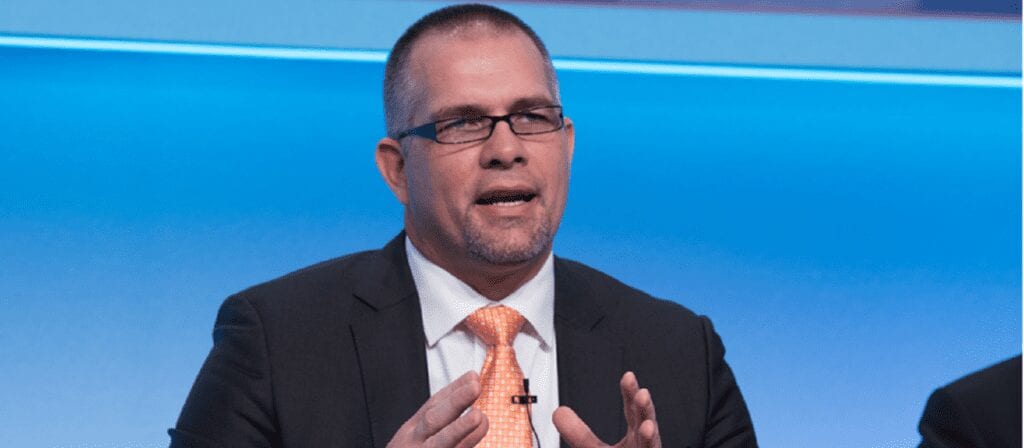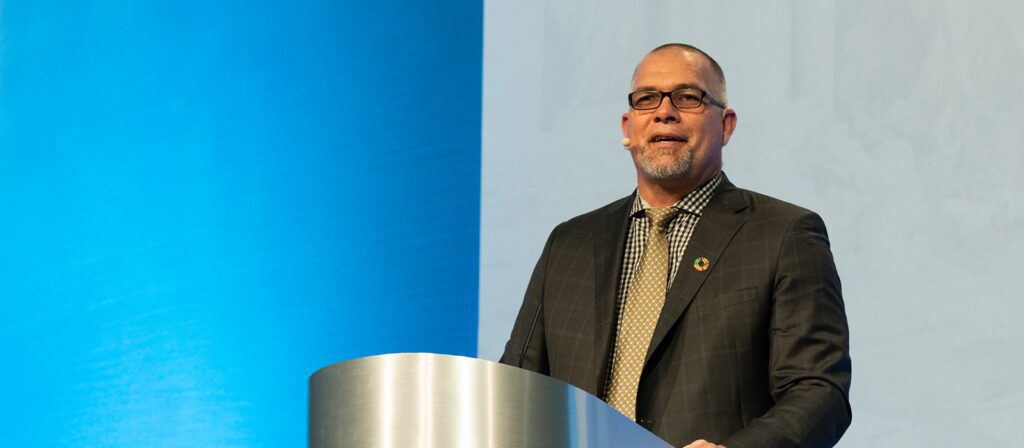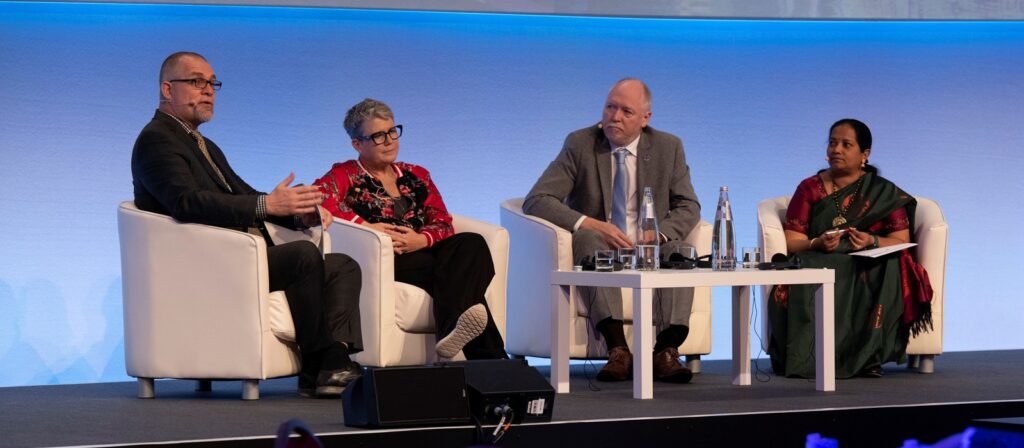Shaun Tarbuck:
Welcome to this very special webinar with our new chair of ICMIF, Rob Wesseling. Rob is also the CEO of the The Co-operators, as you know, and is at the beginning of our new strategy in his term of four years as the chairman of ICMIF. First of all, we’re going to talk a little bit about the The Co-operators, and then we’re going to go a little bit more about ICMIF.
Rob, Co-operators is a purpose-led organization. How does that fit within the current strategy, and whereabouts do you think you are within your current strategy of being purpose-led?
Rob Wesseling:
Right. Well, the The Co-operators has always been purpose-led. With our new strategy, we changed our mission statement into a purpose statement. We only changed one word. This is what we’ve been about since our inception just after the end of the second World War. At that point, the founders of the organizations, there were some mergers that created Co-operators, the founders of the organizations were really trying to ensure that their communities, their families, their colleagues would have better insurance products that were better suited to their needs. Today, we say that we exist to enable a financial security of Canadians and Canadian communities. That’s our purpose, and I’d like to think that our founders would align with that, that that that would be consistent with what they were thinking about. Certainly, it’s consistent with what their actions were at that timeframe.
In terms of, maybe your question is are we done yet, are we there yet? The answer to that is we’ll never be there. There’s always more to do. There will always be unmet and ill-met needs in Canadian society, that’s our focus, and in global society, and so we’ve got a really significant focus on resilience. We have a really significant focus on wealth management, for example, where many Canadians are underserved, and so the credit union system, the cooperative system in Canada is trying to step into that gap. We’ve really just started to scratch the surface from a physical resilience standpoint.
Shaun Tarbuck:
Being a cooperative, does that help you authenticate your purpose-led strategy as well? How does that come forward in doing business?
Rob Wesseling:
Well, we are a cooperative that happens to be a financial services business. The reason that I say it that way is that the cooperative piece is the most important piece. We exist, as I said, to enable the financial security of Canadians and Canadian communities. The best way that we can do that in our view is to operate the suite of financial services businesses that we operate. It’s almost hard to answer the question, so how does that help, because it is who we are. We get up every day to do that.
We also happen to need to run businesses soundly. We need to be relevant and compelling to our members and clients and communities. We need to be properly risked. We have to grow. We have to have a strong value proposition. All of those things are really necessary, but they’re necessary in the service of the purpose. They’re not the purpose on its own, and so, at Co-operators, we think about having a business textbook, and our purpose is written on page one, and everything else is in service of it. We’ll often pause and say, “We need to make a page-one decision now,” and those are choices that might not at first blush be the ones that are most economic. They might not be the biggest opportunities from an economic standpoint, but they’re often the biggest opportunities from an impact standpoint.
What I’ve learned over the years watching how those choices play out is that when we create value for communities, for members, for clients that we are able to harvest some of that value in the business even if it’s not a hundred percent apparent at the time how we’re going to do that, so those purpose-led choices tend to be good business decisions as well at the end of the day.
Shaun Tarbuck:
I was going to come to that as well. You often talk about the decisions you make around purpose and impact of business opportunities. Maybe you can expand a bit more about the business opportunities and the business imperative around that.
Rob Wesseling:
I’ll talk about a couple of historic examples and maybe give you a glimpse into some future-looking ones as well. In the last decade, we were the first PNC insurer in Canada to offer flood insurance. Now, that might be surprising to many because most countries do have flood insurance markets. Canada didn’t for residences. We were the first to offer it. We’re the only one that offers it ubiquitously. We offer it for any type of flood, so even storm surge, which doesn’t exist in the market still outside of Co-operators. That was a page-one decision for us. We did that because it was the single largest risk that Canadian families were exposed to that they couldn’t insure themselves against. That was an unmet need, so we needed to answer the bell and respond to it, and now it’s a significant portion of our homeowner’s portfolio, and it’s a significant differentiator for us, so good business as well.
The other example that I’ll share is that we’ve been on a journey to utilize our balance sheet, our invested assets to drive the types of change that we believe are necessary in Canadian communities. One of the ways that we do that is through impact investing. Currently, we have about 23% of our invested assets in verified impact investments. They are doing things like creating educational opportunities. They’re creating beds in long-term care homes, nonprofit, long-term care homes. They are greening buildings. They’re creating renewable energy, et cetera. That’s a page-one decision. We did that because we wanted to drive impact with our assets.
However, through the steep decline at the beginning of the pandemic, through the market downturn in 2022, that portfolio actually outperformed its sister portfolios in our overall set of invested assets, and so it’s market rates of return, and it’s proven so far to be at lower than market levels of risk. It’s a purpose-based decision that’s also turned out to be a very good economic decision for Co-operators as well.
Shaun Tarbuck:
Just to put that in context, the 23% you talk about, is anyone else in the market, Canadian market or anywhere else outside that you know is close to that, and where do you plan to take that in the future?
Rob Wesseling:
Corporate Knights, which is a Canadian organization that evaluates the citizenship of businesses in Canada and globally, according to Corporate Knight, it is the largest percentage of invested assets in verified impact for any financial institution in Canada and for any insurer globally. Now, I’m not a hundred percent certain that’s the case, but if it’s not, I think we’re pretty close to the top.
Now, we’ve got two additional goals that we’ve added in our next, well, in our now current strategy. By the end of 2026, we will have 50% of our invested assets either in impact, in transition finance or in a new category that we’re calling resiliency finance. The idea there is that we would be using our assets to build resiliency infrastructure in the communities that we serve. By 2030, that will be 60%. The team hates it when I say this, but the question that I have is why not a hundred percent? Why couldn’t every asset that we have invested be driving a favorable impact, have a favorable externality in the communities that we serve? We’re on a journey. It’s a journey that’s proved very fruitful for us so far, and we’re ambitious about where we want to get to.
Shaun Tarbuck:
In terms of getting to the 60% or even a hundred percent, what’s getting in your way for that?
Rob Wesseling:
I think we’ve likely tapped out on impact investments in terms of how those fit into the portfolio and the right spread of risk, et cetera. For transition investing, there has been a limited number of taxonomies that are available to really evaluate whether this investment that you’re making is actually transitioning the economy to net-zero. That barrier is being removed as we speak. Canada has just launched, just released the taxonomy actually that we’re going to be able to use for that purpose, so I’m feeling really bullish about our ability to measure our portfolio against that.
From a resiliency investing perspective, no such market exists in Canada and no such market exists at scale anywhere in the world. This is a new area that we’re trying to be a catalyst in. We know that a substantive amount of investments in adaptation is required if we’re going to meet our carbon reduction goals, our climate change mitigation goals. We’re trying to be a catalyst in that space to create a market in Canada, and hopefully a market will emerge globally after that as well.
Shaun Tarbuck:
Maybe we can come back a bit to that when we talk about ICMIF as well because I think the two are interlinked there.
Rob Wesseling:
A hundred percent.
Shaun Tarbuck:
In terms of the future strategy for the The Co-operators, clearly, resilience is going to be a major part. Maybe you could talk a bit about the indemnity versus resilience connection as well.
Rob Wesseling:
Certainly. We’re sitting here in Manchester, and we’re not that far from London. Since a group of individuals got together in a coffee shop in London and essentially started betting on whether the ships were going to make it back or not, I’m being a bit facetious there, the insurance industry has largely, almost exclusively been about indemnity, so putting individuals, organizations back in a similar place after an adverse event has happened.
I worry and I know the ICMIF membership worries that, as the physical risks that we’re exposed to increase because of climate change and as other risks increase, we may find ourselves in a situation where indemnity products aren’t affordable to a large portion of the population. We call it protection gaps. The protection gap will grow. For businesses like ours, that’s not an acceptable outcome. We exist to meet needs, especially ill-met and un-met needs, and so we need to rethink the business that we’re in, the value that we provide.
Resilience is actually a bigger concept than indemnity. Indemnity is contained within it. Resilience is about not just putting people back in the position that they were before the bad event happened, it’s also about helping them to prevent that bad event from happening or to reduce its impact when it does happen.
Shaun Tarbuck:
What are the challenges are you going to see for the The Co-operators, and are these going to be global challenges or are these regional challenges?
Rob Wesseling:
Yeah, Shaun, I think the challenges are global, and they’re not different in Canada than they are necessarily elsewhere. Canada has a protection gap. It’s not as significant as it is in some developing countries, but it is an important gap, and that gap is growing. Focusing on resilience is a complex challenge for a number of reasons. The challenge itself requires a number of stakeholders to come to the table to find a solution, and so, in Canada, it’s the federal government, it’s provincial governments, it’s municipal governments, it is the financial services industry, the insurance industry specifically who has the modeling and the ability to identify resiliency projects that are actually going to move the dial in terms of reducing risk in communities.
The financial elements of it are complex as well. If you’re going to retrofit a building as an example to reduce its carbon footprint, you can capture cash flows through the reduction of the utility costs when you’ve made that building more efficient, and there’s really a direct line there. When you build a piece of resilient infrastructure, the benefits are in the future when either the disasters don’t happen or the disasters do happen, but the community is able to absorb the impact because that piece of resilient infrastructure is there. The benefits are down the road. They’re not immediate, and so there’s more complexity to it, and I think that’s the case everywhere in the world.
Shaun Tarbuck:
We talked earlier a little bit about what keeps you awake at night as well or what doesn’t keep you awake at night. As a CEO, I mean, maybe you can talk a little bit about that because that reflects on the challenges as well that you’re having to undertake on a day-to-day basis.
Rob Wesseling:
Sure. The topic we’ve just covered is something that keeps me awake at night. How will we be relevant and compelling in a world of increasing risks, in some cases, exponentially increasing risks? In my mind that risk towers over the risk of the next recession. As financial services companies, we should be prepared for the next recession.
Shaun Tarbuck:
When is it coming?
Rob Wesseling:
That’s a great question. We’d be sitting in different chairs I suspect if we knew the answer to that definitively. Near-term natural disasters, those are the other things. We should be prepared for those. We should have the contingency plans, the emergency plans in place. We should have reinsurance in place, our capital deployed effectively so that when the next disaster happens we’re ready to answer the bell and be there for our members and communities and clients. I don’t lose a lot of sleep about those things, but I do lose sleep over how can we remain an important part of the risk solution for our members and clients into the future in this environment that’s becoming more hazardous?
Shaun Tarbuck:
We talked earlier as well a little bit about the fact that the The Co-operators is winning so many awards for the staff and how you treat the staff and the culture you actually have. What’s behind the secret there when you’re always one of the award winners?
Rob Wesseling:
Well, we’re not always one of the award winners. We often are. We have our challenges from an engagement perspective from time to time, but, typically, our engagement is in the best employer range, in the top quartile range in Canada. If I had to point at one thing, I do actually think it’s the alignment that our staff have with the purpose of the organization. We talk about it a lot. We talk about our cooperative nature. We talk about the impact that we desire to have in the communities that we serve, the impact that we desire to have on behalf of our stakeholders.
That drives two things in an organization like ours. One is, if you make a mistake and the mistake that you’ve made was with good intentions and it was aligned with the common purpose that the team have, well, there’s forgiveness for that, and that allows your engagement to stay high even when times are difficult. It’s a galvanizing factor. The other element of it is that, if you get off purpose with the strategy, you hear about it immediately, and so there’s sort of a self-correcting element. I almost think of our cooperative as having a life force of its own, a spirit of its own, and it actually is that collective common good, that collective goal, that collective purpose that the organization has.
Shaun Tarbuck:
Turning to you as an individual, what drives you forward in terms of your leadership and how do you develop even more than you are already?
Rob Wesseling:
Shaun, it’s a privilege and it’s an honor to be able to get up every day and do the work that we do at Co-operators. That is absolutely the driving force. To extend that, I have the opportunity to have involvements in organizations like ICMIF that have this large group of like-minded organizations. We don’t all have the same purpose statement, but we’re all pulling in the same direction on the rope, and so a couple of things there. It’s inspiring to do this work, and so that keeps me motivated and engaged at a very high level.
The other element that’s really specific to ICMIF is that I get to interact with peers that are not competitors for the most part and who have just incredibly inspiring stories, and they’re from all over the world, and so the benefit of that from a personal development perspective, from a professional development perspective is really significant. I’ve got three or four mentors in the ICMIF network. They just don’t know they’re mentors.
Shaun Tarbuck:
We won’t mention the names.
Rob Wesseling:
We won’t mention the names. Yeah.
Shaun Tarbuck:
Just look out for them. Let’s perfectly transition now into the ICMIF part. What excites you the most about our current strategy, about leading with purpose and impact? I mean, you were very much a part of helping set that agenda last year and now as its chairman. You’re the chairman, and so with that title, if you like it, it is our current strategy, so what excites you the most?
Rob Wesseling:
Let me build from the bottom up a little bit on this one. I’m very excited about our partnership with UNDRR. They’re the authors of the Sendai Framework. They are and should be front and center in terms of disaster reduction and adaptation on a global basis, and they’ve chosen to partner with us because they believe that the members of ICMIF and ICMIF itself can move the dial on this really important, global challenge that we have. There’s so much focus on mitigation, climate change mitigation, which is right, but we also need significant focus on adaptation.
I’m also really excited about our partnership with the United Nations Development Program related to the ICMIF Foundation. I actually see a tight synergy between those two initiatives. They’re really about building resilience in communities all over the world, and so, when I think about the impact that cooperative and mutual insurers can have on these two global problems, I find that really just inspiring. We have an opportunity as a global mutual and cooperative insurance movement to really change the course of adaptation and resilience globally, and it’s so important that that occurs.
I’m not sure who else can do it. We have such a long term view and we think about these things in different terms than others in the marketplace might, and so I think we need more cooperative and mutual insurers, and those that we have need to have more influence if we’re going to avoid the worst elements of the climate change crisis that’s coming our way.
Shaun Tarbuck:
The other area that you’re heavily involved in or your team is heavily involved in is developing the ICMIF sustainable development goals benchmark with Swiss Re, which has UNEP PSI’s approval as well. I mean, you are definitely leading in that area along with a number of other ICMIF members. Where do you see that fitting with the Co-operator’s overall strategy and then scaling up into what can this do to the rest of the insurance industry as well as the mutual sector?
Rob Wesseling:
I see these tools as an opportunity for us to have forward-looking benchmarks. Are we on the right path? The Co-operators, in our strategy, we are committed to all of the sustainable development goals. It’s an element that we measure, that we report to our board to, and so the calculator gives us a forward-looking measure to help us understand if we’re on the right track.
These challenges are so complex that we can’t wait until the end of the SDG period and then try and calculate the score. Similarly, we can’t wait until 2050 to determine if we’ve met the net-zero goals. We need to have tools along the way that will help us look forward to understand if we’re making the right progress. The calculator is one of those tools. The ICMIF members have taken a leadership role in its development. I’m hopeful the entire industry will adapt it and adopt it because it will give us a much better sense of whether we’re on track or not.
Shaun Tarbuck:
Yeah, that makes sense. I mean, you have quite a special relationship with Mami Mizutori, the head of the UNDRR, don’t you? Maybe there’s a couple of nice stories where you’ve interacted on a personal level as well, and maybe you can tell a couple of those stories as to how they’ve come about and the impact it’s actually had on other Canadian market.
Rob Wesseling:
First off, I would not have met Mami without my involvement at ICMIF. The Co-operators has a bilateral partnership with UNDRR which would not have happened without the involvement in ICMIF. The collective of ICMIF membership gives us strength and influence with organizations like the UN that an individual company like Co-operators couldn’t have. That’s a real source of value.
Mami and UNDRR are very interested in an initiative that the The Co-operators has launched that I’ve sort of alluded to in this discussion earlier. It’s really about building a resilience investing market. We are focused on Canada, and the idea is that we could invest our assets, and others could as well, to build resilient infrastructure that will protect our communities and protect our stakeholders. UNDRR is interested because no such market exists at scale anywhere in the world. There’s no way that governments can fund the development of all the resilient infrastructure that’s required. Even in a country like Canada, it’s not possible, and so they’ve been a real support for us as we’ve been on this journey to try and pilot this model.
I’ve had opportunities to sit on stage with Mami at UNDRR events. She’s been gracious enough to come to a global event in Canada and sit on stage and talk about resilient investing, which has been immensely helpful in terms of changing minds and influencing the large number of stakeholders that are required to make something like this work. It’s been a really great partnership, and she’s been, on a personal level just a wonderful support for this work. It’s one of the reasons that I’m really hopeful that we’re able to get a pilot and market that’s going to work, and then we can take that model and hand it back to ICMIF and hand it to UNDRR, and hopefully it can be adapted and adopted in many places elsewhere in the world, hopefully globally, because it would be just wonderful to unlock a massive amount of private capital to de-risk the communities that we live in.
Shaun Tarbuck:
Which is one of the new groups that you’re just about to go on to for the investment advisory role for resilience financing, I think, is the UNDRR term.
Rob Wesseling:
That’s correct. Yeah.
Shaun Tarbuck:
Congratulations on joining that group.
Rob Wesseling:
Yeah. Thank you.
Shaun Tarbuck:
We’ve talked a lot about sustainability though, but what other challenges do you see that potentially the ICMIF members could challenge together or that the rest of the industry is also challenged with outside of just the sustainability?
Rob Wesseling:
Shaun, in my view, the insurance industry specifically has not gone through the same sort of transformation that many other industries have gone through over the past couple of decades. We’ve not digitized at the same pace. We’ve not changed our operating models and business models at the same pace that many other parts of the economy have. I worry about that. It feels like an elastic. You pull on and it’s not changing so much, but eventually you’re going to change quickly because you’re going to let one end go, and so when I think about concepts like embedded insurance, so insurance that’s embedded in another transaction, when I think about alternative distribution models, those types of things, I think the industry industry is rife for transformation.
One of the great things about ICMIF is that you actually have an opportunity to interact with organizations that have been successful at and the leaders in areas like the type of transformation that’s going to be necessary, and members share with each other because it’s not a competitive situation in most cases. I think that the transformation focus that ICMIF has in its strategy can really help members drive their transformation agenda forward at pace, at least at a pace that may not be possible if they were doing it on their own. I’m really excited about that. I think it positions us well.
Shaun Tarbuck:
I’ve heard you talk in the past about ICMIF being a unique organization, and you’ve touched on a few things there, but maybe you can expand a little bit more on that. You had some interesting thoughts on how ICMIF would transition through the pandemic as well from where it was to where it is now. Maybe you can share that and give us some advice for the next four years.
Rob Wesseling:
Well, I think about the The Co-operators and the impact the pandemic had on us. The pandemic didn’t change our core products and services. It changed how we delivered them. The world shut down, and we needed to do things digitally that we were doing in-person previously, et cetera. When I think about ICMIF, the pandemic actually changed the core service offerings. We were largely doing in-person events. That was the core service offering. Through the pandemic, I’m actually just so proud of how the organization pivoted and transformed. It’s an incredible set of capabilities, set of tools in the Knowledge Hub, all of the events pivoting to virtual, and what I’m really excited about is that we didn’t just pivot back, so we didn’t just pivot back to now where everything is going to be face-to-face again.
We’ve actually taken the best of what we had to do out of necessity during the pandemic period, and we’ve continued that, so then we have so many more events that are virtual or you can utilize them on demand. We’ve kept the face-to-face events that were most impactful as well. It’s perhaps the best set of transitions that I’ve actually seen through the pandemic period of an organization especially considering that it was the core offering that was impacted. It wasn’t just how the core offering was delivered. I think we’re, as an organization, ICMIF is so much stronger as a result of that. It’s really powerful.
A second element that I think is unique for ICMIF in the trade association space is that you’ve chosen to curate the experiences and capabilities and knowledge of the membership. When you sign on to a seminar, a webinar or when you go to an ICMIF conference, you’re going to hear from ICMIF members who are leading in whatever space it is that we’re talking about. They’re going to share openly about what worked, about what didn’t work. That’s really powerful as well. With the size of the ICMIF team, you might be able to do a tenth or a hundredth of that if the team itself had to do all the research and become experts, but why would you do that when there’s organizations that are leading globally in various spaces that are willing to share that knowledge?
That’s a real advantage as well, that willingness and ability to share the collegiality of the membership. Co-operators competes with a number of members of ICMIF, but we share things with ICMIF members that we compete with that we wouldn’t share with other competitors because we’re trying to accomplish similar things. We have a similar vision for what Canadian communities should look like and the impact that our organizations should have.
Shaun Tarbuck:
There’s a higher purpose really, that it’s not about just competing on the ground. It’s a higher purpose of changing a country or changing a region on the planet. Very kind words. Thank you very much about the ICMIF side of things. You met all of the staff today as well, so you can see now the diversity. Well, maybe you can share some experience from your couple-of-hour session today with the staff.
Rob Wesseling:
Yes. I’m not sure if it was a town hall or not, but we ran maybe a two-hour hour show-and-tell and each of the staff members talked about the work that they’re doing, their involvements. They’re so passionate. That comes through. It’s fantastic. Congratulations for that. I was also struck by the number of different involvements and different roles that staff members have had over their careers. That’s really cool that they’ve been able to build out their own set of capabilities. I think a newbie here is 10 years or something like that. That’s another aspect of it. We had just really a great session today. They asked very insightful, penetrating questions, and I just really enjoyed it.
Shaun Tarbuck:
Yeah, and I think you inspired them as well, so that’s good. Just going back to when you first took over at the ICMIF Conference in Rome, what were your biggest takeaways? The whole event was great, we think, but it’s when you get back to your desk and what do you think differently and what were you going to change. It’s that moment when you reflect and say, well, gosh, I learned that in Rome or I’m going to do it this way or differently. What were your big takeaways for you?
Rob Wesseling:
I always leave these events inspired. The conference in Rome was monumental. I mean, it was the centenary to start with, which is incredible. We signed agreements with both UNDP and UNDRR. That’s really incredible in terms of the impact that these global organizations believe that we can have. I was inspired by that as well, and then, specifically, there were a few presenters that were talking about transformation and the pace that they were transforming and the urgency with which they were transforming. That really gave me some pause because I believed going in, and I still believe now, that Co-operators has an ambitious transformation program, but seeing what some others are doing that are even more ambitious, that created some inspiration and quite frankly a bit of trepidation. That was really helpful as well.
Shaun Tarbuck:
I have two more questions really. What would you like to achieve by the end of your four-year term as chair?
Rob Wesseling:
Right, so what’s the scoreboard look like? ICMIF exists to inspire, to help its membership achieve their own purpose. Now, those purposes, they’re very aligned philosophically. The words might be different and the specific goals might be different, but the one measure, and it’s hard to calculate this, but I would hope that, at end of this four-year period, we would be able to look back and say that we’ve really played a role in enabling ICMIF members to move quickly towards the realization of their purpose. That part is really critical. I would look for significant outcomes from our partnerships with the UNDRR and UNDP. We should have moved those along and have had real impact on the ground as a result of those.
I would hope that things like the SDG calculator will have been widely adopted within our membership and will be, being adopted by the industry more broadly. That’s that forward-looking indicator of whether we’re accomplishing our goals there or not. Maybe this is a bit of a moonshot, but I would love for us at the end of four years to be able to say we have laid the groundwork for a global resiliency investing market. That would be a fantastic outcome. If we can accomplish all those things in the next four years, Shaun, we’ll be very successful.
Shaun Tarbuck:
No pressure. I do think we’ve got some good foundations for all of those at the moment, and I believe we will get there.
Rob Wesseling:
I believe we do.
Shaun Tarbuck:
Just lastly, this is your first message out to the membership, what message would you like to give to the broad membership that we have, the 200 members around the world?
Rob Wesseling:
A few things, first off, just thank you. This organization exists and has the impact that it has on the strength of its membership. That’s critically important. I know that the entire ICMIF team is appreciative of the support. I’m certainly appreciative of the support that we get from the membership. That’s message number one. Message number two is that we have an opportunity in front of us. This feels like our time. The big challenges that we have globally are challenges that we as Co-operators and mutuals, we as the insurance sector, we should play, we must play, if we’re going to solve them, really a significant role. That’s a bit of a call to action.
Shaun Tarbuck:
Yeah, I was I was going to say it is.
Rob Wesseling:
We need more coops and mutuals. We need more insurers that are thinking about solving, trying to solve these big, systemic, global challenges that we have, and then the third one is there are incredible resources available through ICMIF. There’s just such a broad range of programming. There’s so much information in the Knowledge Hub, so please, when you’ve got a challenge in your own business, when you want to develop your own people, think of ICMIF and reach out. We want you to get as much value as you possibly can out of your membership. It goes back to the first message around being so thankful for the engagement. That’s how we can keep it that way.
Shaun Tarbuck:
Yeah. Well, thank you very much, Rob. Very insightful, and thank you for joining us today.
Rob Wesseling:
Yeah. That’s great, Shaun. Thank you.
The above text has been produced by machine transcription from the webinar recording. ICMIF has made every effort to ensure that transcriptions are as accurate as possible, however, in some cases some text may be incomplete or inaccurate due to inaudible passages or transcription errors. Listening to or watching the webinar recording will allow you to hear the full text as delivered during the webinar but this is available in English only. Our transcriptions are provided to enable members to select the language of their choosing using the dropdown menu above.





